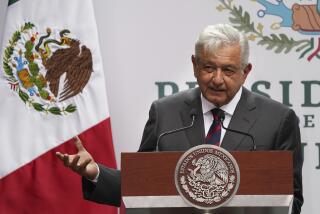An Information Island
- Share via
Watching Fidel Castro, it’s no leap to conclude that he is his own worst enemy. Too bad so many Cubans are harmed by his desperation to maintain control.
He gets nervous when he senses danger and reacts by cracking down on the innocent, as he did earlier this month with a new law to punish Cuban citizens who speak to foreign reporters. The penalty? Up to 20 years in jail.
The law makes it a crime to “collaborate with the U.S.” How? By talking, whether directly or through third parties, with foreign radio or television stations, newspapers, magazines or other means of communication.
In January, before the law was promulgated, six Cuban journalists were jailed for “contempt,” “false information” and “enemy propaganda.”
Defenders of Castro say he was pushed into this corner by the actions of a small group of fanatics in Miami’s Cuban exile community that is, in fact, responsible for botched assassination plots and small terrorist acts in Havana. But though noisy, these provocateurs are few in number and clumsy in their tasks. They are a poor reason for such drastic repression.
Cuba’s new press law will give fodder to those who are pushing the Clinton administration for a harder line against Castro and even fewer ties to its people. That would be a mistake; more fresh air, not less, is needed.
But Castro should not be allowed to ride on, ignored. Democratic institutions throughout the hemisphere, including those in countries with close ties to Cuba, should condemn the restrictive new press law.
More to Read
Sign up for Essential California
The most important California stories and recommendations in your inbox every morning.
You may occasionally receive promotional content from the Los Angeles Times.













